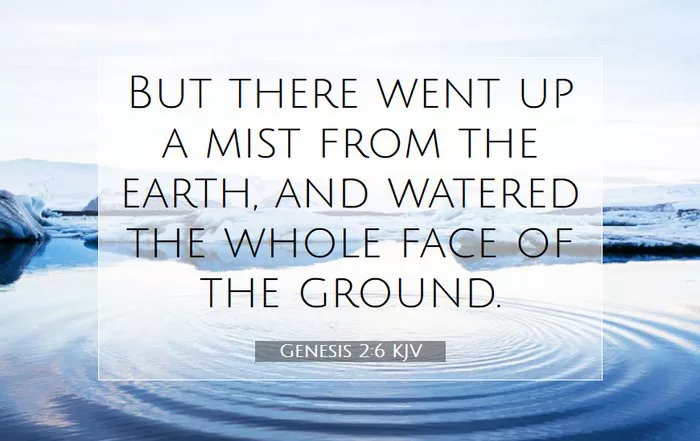Read the Daily Bible Verse Genesis 2:6 To Strengthen Your Spiritual Journey.
The Book of Genesis serves as the cornerstone of the Judeo-Christian narrative, presenting foundational themes about creation, humanity’s relationship with God, and the origins of human civilization. Genesis 2:6, in particular, offers insight into the initial conditions of the Earth and humanity’s environment. This verse, though brief, provides a significant pivot from the cosmic scale of Genesis 1 to the more intimate and detailed account of human creation in Genesis 2. Understanding this verse requires an exploration of its context, meaning, and implications both in ancient times and for modern readers.
The Context of Genesis 2:6 KJV
To grasp the significance of Genesis 2:6, we must consider its position within the creation narrative. Genesis 1 offers a macro perspective, detailing the sequential creation of the world in six days, culminating in the creation of humankind. Genesis 2 zooms in on the sixth day, providing a micro view of the creation of man and woman and their immediate surroundings.
Genesis 2:6, as found in the King James Version (KJV), reads: “But there went up a mist from the earth, and watered the whole face of the ground.” This verse describes a unique method of irrigation during the time of creation, setting the stage for the formation of the Garden of Eden. Prior to this verse, Genesis 2:5 mentions the absence of rain and the need for a human to cultivate the land, suggesting a symbiotic relationship between the earth’s watering and the emergence of humanity.
The Genesis 2:6 Meaning
The term “mist” in Genesis 2:6 has been subject to various interpretations. Some translations render it as a “stream” or “fountain,” implying a natural irrigation system emerging from the ground. This imagery aligns with the Mesopotamian context, where rivers like the Tigris and Euphrates were crucial for agriculture.
In a symbolic sense, the mist represents God’s providential care over the Earth, ensuring its readiness to sustain life. This divine irrigation contrasts with the later depiction of the flood in Genesis 6-9, highlighting a delicate balance between nurturing and destructive waters.
Genesis 2:6 also serves as a prelude to the formation of Adam from the dust of the ground (Genesis 2:7). The moistening of the earth by the mist can be seen as a preparatory act, creating a fertile environment for God’s creative work. This connection emphasizes the intimate involvement of God in the creation process, shaping humanity from the very elements of the earth.
See Also: What Does Genesis 1:29 Mean?
Genesis 2:6 Application in Life
In practical terms, Genesis 2:6 reminds us of the importance of stewardship and sustainability. The image of the earth being naturally watered speaks to a harmonious relationship between humans and their environment. In a world facing ecological challenges, this verse encourages us to consider how we can responsibly manage and preserve the resources we have been given.
Moreover, the verse underscores the significance of preparation and nurturing in our personal and spiritual lives. Just as the mist prepared the ground for the creation of humanity, we too are called to cultivate our hearts and minds, making them receptive to God’s work in us.
Comparison with Other Biblical Texts
Genesis 2:6 can be compared with other biblical passages that discuss water and its symbolic meanings. For instance, Isaiah 55:10-11 uses the imagery of rain and snow to illustrate how God’s word nourishes and accomplishes His purposes. Similarly, John 4:14 and John 7:38 portray water as a symbol of eternal life and the Holy Spirit.
These comparisons highlight the multifaceted role of water in the Bible, serving as a physical necessity, a means of divine judgment (as in the Flood), and a metaphor for spiritual sustenance and renewal.
Modern-Day Relevance
In a contemporary context, Genesis 2:6 holds relevance in discussions about environmental ethics and sustainability. The verse prompts us to reflect on our relationship with the natural world, urging us to adopt practices that promote the flourishing of all creation. It also invites us to consider the spiritual parallels of nurturing and preparing our lives for growth and transformation.
Conclusion
Genesis 2:6, though a single verse, encapsulates a profound truth about God’s provision and the intricate balance of creation. It calls us to recognize the divine care embedded in the natural world and challenges us to mirror that care in our interactions with the environment and one another. As we meditate on this verse, we are invited to explore deeper themes of stewardship, preparation, and the sustaining power of God’s presence in our lives.
Genesis 2:6 Commentary
The commentary on Genesis 2:6 reveals a rich tapestry of interpretations and applications. Scholars and theologians have explored its linguistic nuances, historical context, and theological implications. The verse serves as a reminder of the interconnectedness of creation and the Creator’s intimate involvement in the world. As we engage with this text, we are encouraged to seek a deeper understanding of our place in God’s creation and our role in nurturing and preserving it for future generations.


